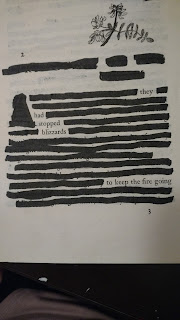Materials Needed:
- An old book or newspaper or magazine. Really anything that has words on it that you aren't using anymore. You should NOT use a book that was expensive, or that you're planning on using again. I'd recommend going to your local library or used bookstore and picking up one of those 25 cent paperbacks so you don't have to feel guilty about vandalizing a book. I'm using a book that was falling apart anyway, and that I have a double copy of.
- A pencil (this is optional)
- A black marker or Sharpie. You can also use paint, which I'm not really sure how that works, but you could experiment with it. I'm using a calligraphy marker, because I happen to have one, but if you have a Sharpie laying around you can use that instead (be forewarned that Sharpies bleed through pages).
- That is literally it!
Step 1: Find a page in your book/newspaper/magazine.
It can be a scene that you like, or just a random page. Make sure that you don't go right into blacking things out, because if you make a mistake and start blacking things out that you didn't mean to, you have ruined your poem (sorry to be harsh, but it's true!).
Step 2: Underline the words you want to use with a pencil
It isn't completely necessary to do this, but I think that it's really helpful because then you know which words you want to save.
This part is probably the hardest part of the entire process, because you can't just add words you want to use. Your poem can make no sense ("remember that here we laugh at gophers") or be really metaphorical ("they had stopped blizzards to keep the fire going") (and yes, both examples are mine). A tip that I found useful is to black out some of the word but not all. For example, if you needed the word "is" and there is not an "is" where you need it to be but there is a "this," black out the "th" part and your problem is solved.
Step 4: Black out the unwanted words!
This is the fun part! It can feel a little weird at first, because you are literally scribbling with a Sharpie all over a book, but it's all in the name of art.
Try different patterns: you can highlight the words you don't want, you can cover the whole page, you can draw designs on the page, you name it! I'm going to show a couple examples but since I have no drawing skills I will use one or two off of the Internet.
Step 5: Erase any pencil marks.
This is important because it just makes your poem look nicer.
You're done!
Other examples:

https://www.lynnereeder.com/uploads/1/0/8/4/108411141/p71_orig.png

https://s-media-cache-ak0.pinimg.com/474x/96/66/cb/9666cb41984565e62dff526577acbe57.jpg
Have you ever tried blackout poetry? How did it turn out? Let me know in the comments!







